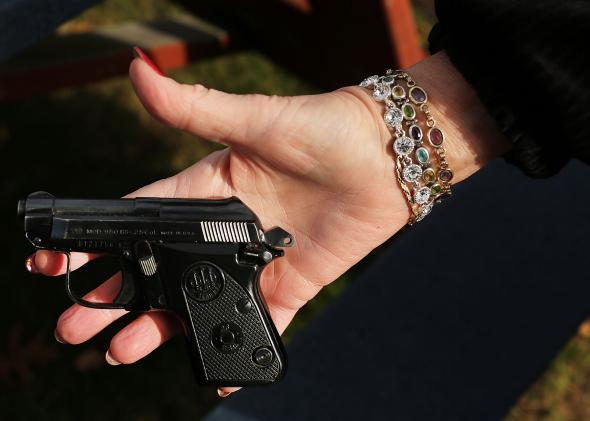Women, Guns, and the NRA

Photo by Spencer Platt/Getty Images
This week the NRA debuted the first ad in a campaign against Michael Bloomberg, who has poured millions of his fortune into gun control efforts, and pledged in April to contribute $50 million more through his group Everytown for Gun Safety. The spot stars a trim blonde woman driving a truck through simulated American heartland hills and suburb, while the female voiceover paints Bloomberg as an out-of-touch liberal elite who wants to trample on Americans’ right to defend themselves, along with their rights to eat and drink what they want. NRA ads used to feature tough looking men talking about good guys versus bad. Now it wants to appeal to the country’s feminine half.
Not long ago, few people paid attention to women and guns (apart from crass pin-uppy “gals with Glocks” spreads ubiquitous in certain lad mags). The American gun industry was historically far more interested in the wants of white middle-aged men. Advocates for better gun laws, on the other hand, used to focus their research on regional and socioeconomic attitudes rather than gender, says Lanae Erickson of Third Way, a think-tank. But both camps in the gun debate seem to have woken up to the importance of women and their potential as an under-engaged but powerful demographic.
Much of this came in the wake of the tragedy at Sandy Hook. “Before that, I didn’t know much about guns,” says Shannon Watts, who founded Moms Demand Action for Gun Sense shortly afterward. “But after Sandy Hook, I started learning more, and I think a lot of mothers saw what happened and said ‘not my child, not me’ and decided to get active.” Her group united with Bloomberg’s Mayors Against Illegal Guns to form Everytown for Gun Safety: Making gun violence a voting issue for women is a key objective she told the New York Times, as is affecting corporate tolerance for lax gun policy. Women may be in the minority in Congress and in boardrooms, Watts points out, but they make 86 percent of household spending decisions. That has the NRA scared, because “they know how strong our message is” when mothers stand against the gun lobby.
“The NRA knows that women have recently been effective messengers on gun safety and gun access issues,” says Erickson, “and they’ve been very smart in crafting a way to appeal more to a demographic they’ve not been very good with.” Female witnesses for the NRA are put forward at congressional hearings. Gun manufacturers increasingly pay attention to products marketed toward women. Within the last few years, women have stepped “out of the shadows” and connected with communities of other women who are interested in guns, for sport or for protection, says Carrie Lightfoot, an NRA licensed instructor and founder of The Well Armed Woman, a shooting and gun education society. “We are moving towards a new mode of women as our own protectors and as protectors of our families,” Lightfoot says.
Lightfoot says she understands the impulse of mothers like those in Watts’ group that advocate for better gun laws after senseless school shootings. But echoing the message from many gun groups, she believes it’s better to be armed than defenseless.
She is not alone in the sentiment: Gun ownership among women has risen (slightly) in the last year. “Glocker Moms” against Bloomberg made a splash at this year’s annual NRA meeting. They see Bloomberg and gun law activists as paternalistic figures who think they know what’s best for these women’s families—this is what the new ad speaks to with its “get your hands off” narration. (Everytown for Gun Safety supports the choice to own guns, and some mothers in Watts’ group are gun owners). That has helped the NRA’s guns-as-empowered self-defense message resonate, despite evidence that women with guns in their household are more likely to experience violence.
Women like Lightfoot are in the minority, says Erickson. Most women back more gun regulation. And Lightfoot and women like her don’t want to see guns fall into the wrong hands, either. The difference is that she buys the NRA’s argument that we should not have more regulations, but do a better job of implementing current background checks. But it is hard to square that with the fact that the NRA opposes legislation to expand background databases, such as the Klobuchar bill, which seeks to prevent stalkers—usually men targeting vulnerable women—from buying guns.
